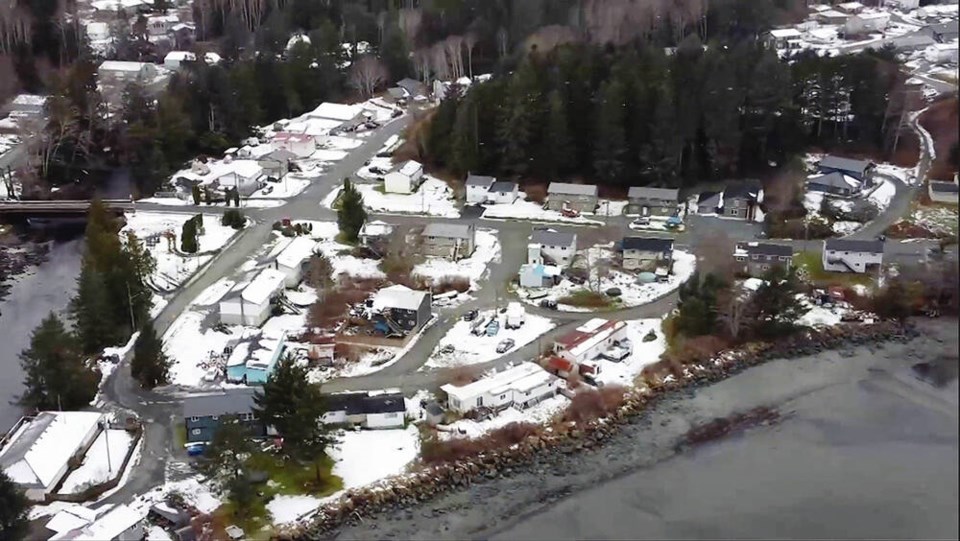Premier David Eby says health officials are working with Port Hardy and the Gwa’sala-‘Nakwaxda’xw Nations in the wake of 11 drug-and-alcohol related deaths.
“My understanding is that Island Health is in conversations with the nation about that, and that the First Nations Health Authority has also been responsive to this concern brought forward by the nation, and we’re going to make sure that that work continues and that it results in supports on the ground.”
Last Monday, the 1,100-member Gwa’sala-‘Nakwaxda’xw Nations declared a state of emergency for the reserve following the deaths of 11 of its members, many of them youths, in the past two months, in part because of toxic drugs.
More than half the nation’s population lives on its main reserve by the Tsulquate River across from Port Hardy.
Port Hardy Mayor Pat Corbett-Labatt said the town has been shaken by the deaths. “We’re all connected, we’re within walking distance,” she said. “Everybody is coming together, working so hard for our youth and for the grieving families.”
Corbett-Labatt said Port Hardy needs two full-time-equivalent support workers to provide around-the-clock services for the area’s homeless and precariously housed youth. “We need more help for those youth.”
Port Hardy is the first rural community in B.C. to have a Foundry centre, which provides young people ages 12-24 with mental-health and addiction counselling, health care, peer support and social services.
Asked about whether there are plans to expand Port Hardy’s Foundry centre to offer around-the-clock services, Mental Health and Addictions Minister Jennifer Whiteside said her ministry is currently focused on expanding the geographical reach of its services.
Whiteside was in Surrey on Monday to announce the opening of 10 more Foundry centres, including three for Â鶹´«Ã½Ó³»Island, in the Sooke-West Shore, Nanaimo and Port Alberni.
Dr. Alex Nataros, a family physician and medical director of the community health centre, said a 24/7 recreation centre would go a long way toward reducing premature deaths.
“We need some safe space for our youth,” said Nataros. “Right now, our youth are getting into trouble, are using substances and alcohol … and have no safe space to go to.”
Nataros said drug and alcohol-related deaths in the North Island are “far above” the 11 in Gwa’sala-‘Nakwaxda’xw and include additional deaths in the other two First Nations and the urban population of Port Hardy.
“What I’m seeing is unprecedented trauma and tragedy,” said Nataros. “I’ve worked in four different provinces and I’ve never even heard of anything to the scale of what we’re facing here in the North Island.”
Nataros and his physician colleagues have been sounding the alarm with health and government officials and media, he said, adding people are overdosing and “dying in the ambulances” on the way to Port McNeill Hospital’s emergency room.
Ambulances began being diverted to Port McNeill Hospital after overnight ER closures started in January 2023 at Port Hardy Hospital as part of what Health Minister Adrian Dix called temporary measures to stabilize services.
Regular hospital hours would return “as soon as staffing is sufficient,” he said then.
Nataros said Port Hardy’s emergency department needs to immediately reopen 24 hours a day, seven days a week. “And we need an immediate emergency response to provide a safe space for our youth,” said the physician.
Nataros said on Monday, he met with a Quatsino patient who reported he had two family members overdose that morning, one of whom died.
“I’ve got a UBC med student with me this month, and his mouth was wide open at today’s meeting,” he said. “This is an active emergency.”
Corbett-Labatt said she has faced calls to declare a state of emergency in Port Hardy due to the lack of accessible health care.
While she would “dearly love” for Port Hardy Hospital to resume around-the-clock operations, Corbett-Labatt said a municipal state of emergency is usually only called when there is an urgent need for evacuation.
Eby said the North Island First Nations community has made “very specific requests” to Island Health to help people struggling with addiction.
Health directors from the Gwa’sala ‘Nakwaxda’xw and nearby Kwakiutl and Quatsino First Nations issued a joint statement on Friday asking for Island Health to fund on-call community outreach workers in each community for the next 30 days to address the unfolding mental-health crisis.
The three North Island nations have requested a tri-nation co-ordinator to oversee the crisis response and provide preventative programs for community members.
Island Health provided a short statement Monday acknowledging the requests and said it has “committed to work with them to address the specifics asks.”
In response to the Gwa’sala-‘Nakwaxda’xw’s request for RCMP to enforce its local bylaws aimed at deterring drug dealers and drugs from entering the community, Eby said it shouldn’t be the responsibility of a local government to ask the RCMP to arrest drug traffickers.
“That’s something that should be happening, and that’s something that is happening across the province,” said Eby.
Note to readers: This story has been corrected. Three new Foundry locations are planned for Â鶹´«Ã½Ó³»Island. A previous version incorrectly said there would be two.
>>> To comment on this article, write a letter to the editor: [email protected]



